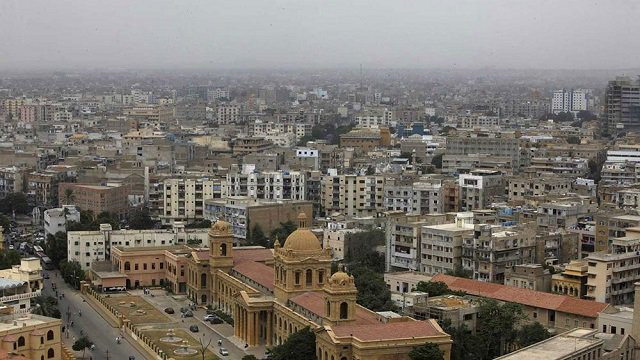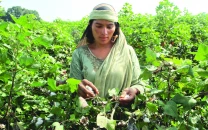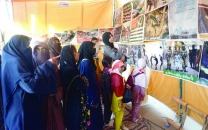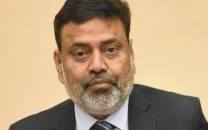For Sindh, a decade stuck in development hell
A number of schemes were announced, billions were spent, but many still await completion as we exit the 2010s

Karachi Skyline. PHOTO: Reuters
 The 2010s have been a mixed bag for Sindh when it comes to infrastructure expansion and improvement. Although a number of development schemes were announced, not all of them have seen fruition so far. The overall pace of progress on many initiatives remained slow throughout the decade for many different reasons and the average resident has been unable to avail benefits from several others due to administrative snags.
The 2010s have been a mixed bag for Sindh when it comes to infrastructure expansion and improvement. Although a number of development schemes were announced, not all of them have seen fruition so far. The overall pace of progress on many initiatives remained slow throughout the decade for many different reasons and the average resident has been unable to avail benefits from several others due to administrative snags.Among the significant development schemes launched in the outgoing decade are the establishment of a coal-based power plant and expansion of coal-mining operations in Thar. Similarly, the province's road network has undergone considerable transformation, easing travel and trade operations.
On the other hand, although the provincial government spent billions of rupees on sectors like health, education and irrigation, the common person has so far been unable to draw much benefit from many of them.
From 2014-15 to 2018-19, the government allocated more than Rs952 billion to its Annual Development Programme (ADP). However, it only got around to releasing around Rs683 billion in that five-year span, according to official figures.
And although the province's budgetary allocation for development initially continued to increase in size every fiscal year, that trend stopped in 2018-19, when Sindh authorities began slashing that head on the pretext of not receiving enough funds from the centre. From a Rs143 billion allocation in 2014-15, the ADP share peaked with Rs244 billion in 2017-18, but shrank to Rs223 billion the following year and only went up slightly to Rs228 billion in the current fiscal.
During the first six months of the current fiscal, the government has released almost Rs79 billion, about 51 per cent of which have been utilised, official data showed. As the Sindh government holds fast to complaints that the federal government is not giving it enough money, several provincial departments, like energy, environment, human rights and the Board of Revenue, has not spent a single penny on development schemes in this period.
Speaking to The Express Tribune, Sindh Information Minister Saeed Ghani placed the blame for lack of development on the federal government's shoulders. "Not enough funds and delayed disbursement from the centre has been a major problem for us," he claimed. Recently, Sindh Chief Minister Murad Ali Shah told the media that the centre owes Sindh around Rs116 billion of its share under the National Finance Commission award.
"That, and the National Accountability Bureau's actions against the bureaucracy has slowed progress on development schemes," said Ghani, who until a few months ago, served as Sindh's local governments minister. He insisted that "overall, development in the province has moved ahead on a fast-track basis."
"The Pakistan Peoples Party government carried out record-breaking development in Thar during this outgoing decade and we also improved the inter-district road network during this period," he said. "We also increased the number of hospitals in the province and expanded the network of the National Institute for Cardiovascular Diseases."
Opposition parties, however, reject the PPP government's 'excuse' for reducing the allocation for development. "Funding deficits have affected all provinces equally as NFC disbursements are worked out on a percentage basis," said opposition MPA Arif Mustafa Jatoi. "Only the Sindh government is using it as an excuse to defer development."
He pointed that out that much of the province's infrastructure continues to be in very poor condition due to lack of bureaucratic and parliamentary oversight. Students in other provinces have been provided laptops and internet facilities while in Sindh, many schools still suffer from a lack of basic facilities such as boundary walls or toilets.
"The provincial government has been unable to provide basic public transportation network in even the country's largest city, Karachi. The main focus of PPP government in Sindh is providing government jobs which only add to the non-development budget," he said, adding that it will be a severe budgetary burden in future as these employees will claim gratuity and pensions on their retirement.
Many development schemes have strayed far from their original timetable due to administrative and financial issues. For instance, both the Green Line and Orange Line Bus Rapid Transit projects are around three years behind schedule. The former, worth about Rs24 billion, is being funded by the federal government, while the latter, costing around Rs1.19 billion, is being undertaken by the Sindh government.
Both governments are also responsible for reviving the long-delayed Karachi Circular Railway (KCR) project, which was expected to cost around Rs276 billion before the rupee's value against the dollar plunged drastically. Commissioned in 1967, KCR remained effective till 1984. Recently, the project has been included in the China-Pakistan Economic Corridor.
The energy front, however, has seen some development, most notably the 600MW Thar Coal Power Project completed under a public-private partnership. The provincial government is also working on developing alternative energy sources through projects like the Gharo-Keti Bandar Wind Corridor in Thatta.
Roads too have undergone significant change, with the completion of the Karachi-Hyderabad Motorway (M-9) being a centerpiece scheme. Other projects, such as the Hyderabad-Mirpurkhas and Karachi-Keti Bandar roads, have not enjoyed the same rapid progress.
Despite the billions of rupees spent on health and education, both sectors are still in a sorry state. Hundreds of schools continue to run without basic facilities while several health emergencies, the HIV outbreak in the PPP stronghold of Larkana being the most recent one, have exposed the provincial government's inadequacies.
Published in The Express Tribune, December 30th, 2019.



















COMMENTS
Comments are moderated and generally will be posted if they are on-topic and not abusive.
For more information, please see our Comments FAQ